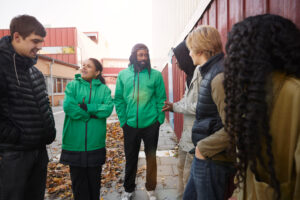When talking about sustainability, three dimensions are often mentioned: environmental, economic, and social sustainability. To build and maintain a democratic and resilient society, all three aspects of sustainability are equally important.
Social sustainability focuses on improving individuals’ quality of life and creating a sustainable, healthy, and just society that is inclusive of everyone, regardless of gender, sex, background, or disability.

Image by Plattform/Johnér/imagebank.sweden.se
The social aspect of sustainable development should be prioritized in local, regional, and national planning, guiding decisions that promote inclusive and equitable physical spaces and urban systems like transportation and access to services. This helps avoid increasing social and spatial inequalities.
Key elements of social sustainability include well-being, justice, influence, rights, and meeting individual needs, with an emphasis on participation and social cohesion. A sustainable society is one where people live fulfilling lives with good health and without unjust disparities. Such societies are resilient, capable of recovering from crises, and open to change, with characteristics like tolerance, trust, and active participation in social development.
Social sustainability emphasizes the importance of citizen involvement, which can lead to greater understanding, engagement, and knowledge. Depending on the local context, different issues are prioritized.
Sweden is engaged in a wide range of issues related to social sustainability, where human rights are at the core. Sweden is ranked as one of the best countries when it comes to gender equality and is home to many entrepreneurs and start-ups within social innovation.